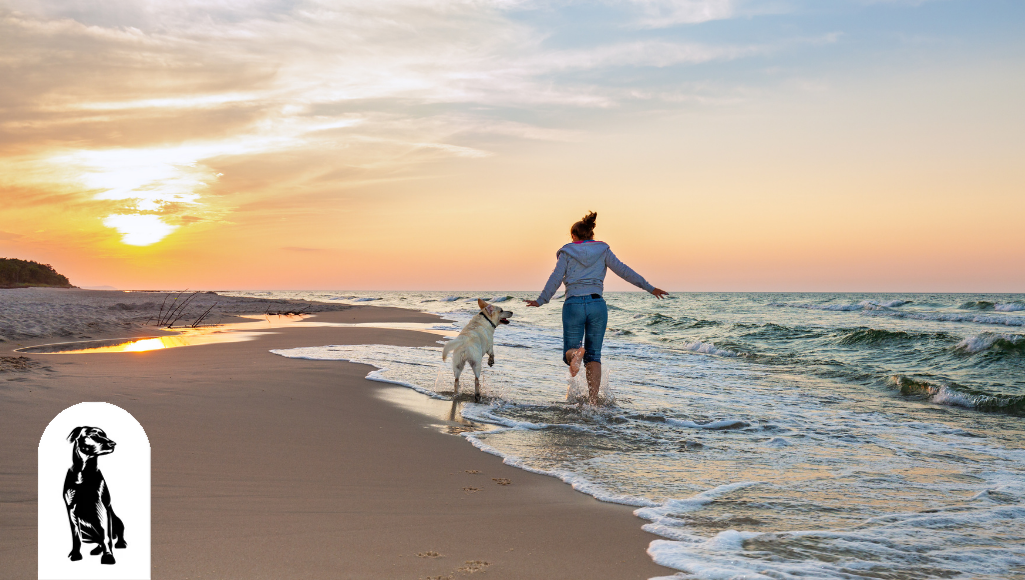
It's summertime! And if you're looking for some fun in the sun with your pup, you might wonder if taking your dog to the beach is a good idea.
Going to the beach is such a fun way to embrace the beautiful summer weather, and for dog lovers, bringing your pup might be a great way to get out of the house and give your dog some exercise. Whether it's for a quick stroll on the sand or a full day by the ocean, if your dog likes being outside, around people, and near water, you can bet they'll love the beach as much as you do. So is it a good idea to bring your pup to the beach? Sure! But before you head out, read the rest of this article to ensure you're well prepared.
Make Sure Your Dog Is a Good Swimmer
Before heading to the beach, it's a good idea to make sure your dog likes water and is a good swimmer. Many dogs might be natural swimmers, but might not be a fan of jumping in the water. So, before heading to the ocean, where it might be a little more choppy, find a pool or a small swimming hole where you can train your dog to swim and get them comfortable in the water.
If you feel like your pup is not a natural swimmer or if you feel like they would be more comfortable around water with it, you can always invest in a life jacket made just for dogs! You can find these at most pet stores during the summer or online with a quick search.
Does the Beach Allow Dogs?
Something important to keep in mind when taking your dog to the beach is that many beaches don't allow dogs—because of this, searching for a dog-friendly beach near you is well worth your time. Most beaches will have clear signage warning whether or not dogs are allowed and what rules apply to them if they are allowed. BringFido is a great resource for finding beaches that allow dogs and details each location's rules and expectations.
Fresh Water and Shade are a Must
Whenever you and your pup are out in the sun for an extended period of time, fresh water and shade must always be available. Since beaches don't typically have a lot of natural shade, you might consider bringing a large umbrella or easy-up tent to create your own shade, giving your dog a nice shady place to rest. It's also important to ensure that they are drinking plenty of water to keep them hydrated and prevent heat exhaustion.
Don't Forget the Sunscreen
Did you know that dogs can get sunburn, too? Dog breeds with short hair or who have recently been shaven can be affected by the sun. It is recommended that you use a chemical-free sunscreen with at least 30 SPF. If your dog is a swimmer, consider something that's waterproof. Just as you would with yourself, reapply the sunscreen frequently, and for the pup, make sure to take extra care of their nose, ears, and paws.
Always Make Sure to Clean Up After Your Dog
Every dog beach requires dog owners to clean up any dropping left behind by their four-legged friend. Dog feces is a known problem for sea life and wildlife and can lead to water and soil contamination. Most beaches are supplied with bags for picking up after your dog, but it's always best to pack your own when taking your dog to the beach and always be mindful about anything your dog leaves behind and always properly dispose of it.
Use a Leash and Work on Their Recall
Similar to dog parks, many dog beaches allow our four-legged friends to be off their leash and play with other dogs as they please. However, keeping your dog on a leash is wise as they are still getting themselves familiar with their surroundings, especially if they aren't great with their recall. If you don't yet trust your dog to always come back when they are called, leaving them on the leash is a much better option for both you and your dog.
Pack the First Aid Kit
Just like any other outing with your dog, packing the first aid kit is essential. According to DogTime, here are a few things you should bring along:
- Vaccination and medical records - if there is an emergency, having all their medical history on hand can be extremely beneficial.
- Hydrogen peroxide - Use hydrogen peroxide for cleaning minor wounds and can also be used to induce vomiting if your dog so happens to get into something toxic.
- Antibiotic ointment - Used to prevent infection and even relieve pain from wounds.
- Gauze, scissors, tape, and rubber gloves - These are all first aid essentials for cuts, deeper wounds, and even as a temporary brace for sprains and fractures.
- Fresh water - Water can be used for both cleaning and for consumption.
- Medications - If your dog happens to take medication, keep a backup supply of their medicine in their first aid kit in the event of an emergency.
Recognizing Heat Exhaustion in Dogs
When taking your dog to the beach, you want to know any signs of heat exhaustion or heat stroke and how to treat it. Here are the signs to look out for:
- Difficulty breathing
- Excessive drooling
- High fever
- Lack of urination
- Rapid pulse
- Dehydration signs (dry nose, visible tiredness, sunken eyes, excessive panting)
- Vomiting or diarrhea
- Dizziness and trouble walking straight
- Lethargy
Here's how you can help to treat heat exhaustion in your dog:
- Guide your dog to a cooler (preferably indoors) area
- Give them cool (but not too cold!) water to drink
- Wrap a cool towel around them, again not too cold as it could send their body into shock
- Consult with a veterinarian as soon as possible
Keep the Sand at Bay with Plush Paws Products
After taking your dog to the beach, you might be concerned about the mess in your car after the fact. But with a car seat cover from Plush Paws Products, that's the least of your worries! We make car seat covers for all sizes of dogs and cars to ensure that your vehicle stays clean while your trusty companion stays comfortable. Ready for a fun day at the beach? Shop our extensive collection of car seat covers today!
